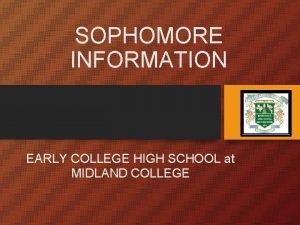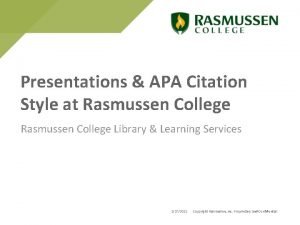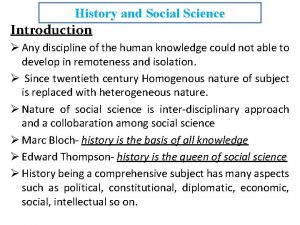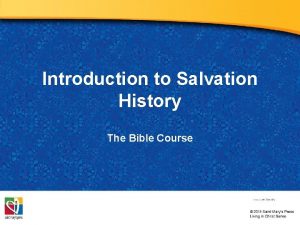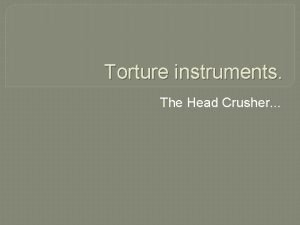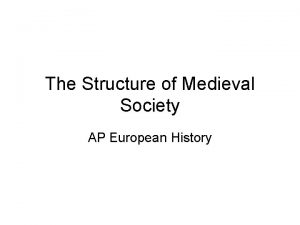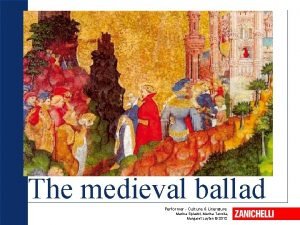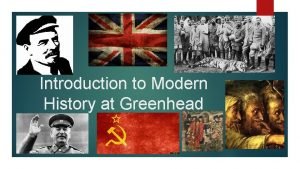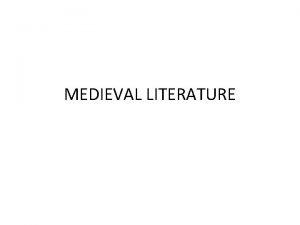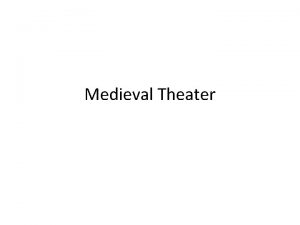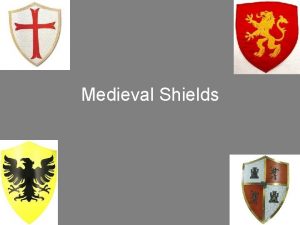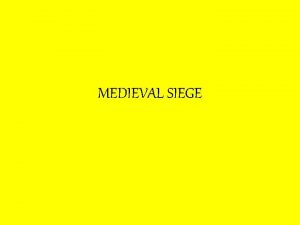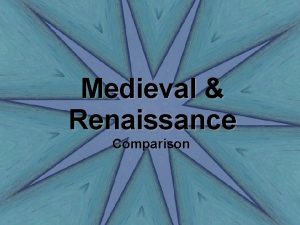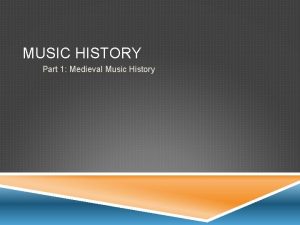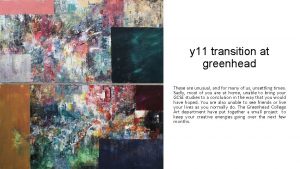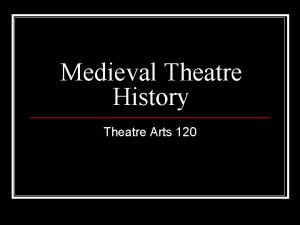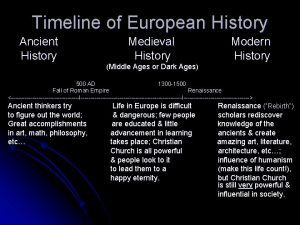AN INTRODUCTION TO MEDIEVAL HISTORY GREENHEAD COLLEGE THINK
















- Slides: 16

AN INTRODUCTION TO MEDIEVAL HISTORY @ GREENHEAD COLLEGE

THINK ABOUT THE ‘MIDDLE AGES’ AND WRITE DOWN 10 WORDS WHICH COME TO MIND

• Now…think about a film, TV programme, book or computer game which has given you information about Medieval History… • What impression of Medieval History did you gain as a result?

• Have you visited anywhere which gave you information about the Middle Ages? Make a list. • What picture of life in the Middle Ages was created by your visit(s)?

COMMON MODERN PERCEPTIONS OF THE MIDDLE AGES: • The time we live in now is far superior • The Middle Ages were violent and unlawful • There was a lack of scientific advancement • Everyone was committed to religious practices which are now clearly outdated • Disease and poverty were the main concerns for people • Rulers were oppressive

THINGS ABOUT THE MIDDLE AGES WHICH MIGHT SURPRISE YOU (1) • Our parliamentary system began to develop in the 13 th century • This was on the back of the MAGNA CARTA which set out a list of restrictions upon the king. The original Magna Carta (1215) was ignored by King John- but his son and grandson both reissued it, in an attempt to gain support from their barons (important men/landholders).

THINGS ABOUT THE MIDDLE AGES WHICH MIGHT SURPRISE YOU (2) • Whilst punishments were quite harsh by modern standards, the English legal system was actually quite well developed • King Henry II (1154 -1189) is often considered the father of the ‘Common Law’ system in England • He centralised justice, utilised juries and the first legal textbook was written in his reign

THINGS ABOUT THE MIDDLE AGES WHICH MIGHT SURPRISE YOU (3) • There was a great amount of learning being undertaken. Oxford (11 th century) and Cambridge (13 th century) Universities had been founded, many travelled to Europe for training- e. g. to Paris or Bologna. Students would typically speak at least 3 languages. • The sophistication of medieval buildings (e. g. castles and cathedrals) suggests that there was a great deal of scientific knowledge

THINGS ABOUT THE MIDDLE AGES WHICH MIGHT SURPRISE YOU (4) • Governments were actually very ‘professional’ in their organisation. • Kings and rulers across Europe were capable of raising huge sums of money in very short time frames- something which would only be possible if they had a well oiled bureaucracy. • In England there was an Exchequer (which audited the money), a Chancery (which dealt with the King’s letters and official documents) and each local area had its own Sheriff who administered locally on behalf of the King. • In 1193 England was able to pay £ 60, 000 to ransom the King (who had been captured on his way back from the Third Crusade) in a matter of months. This is about 43 million pounds today.

THINGS ABOUT THE MIDDLE AGES WHICH MIGHT SURPRISE YOU (5) • Medieval people had real feelings just like people do nowadays. Their fears and hopes made them act in ways which might seem strange to us, but they make sense once you put yourselves in their shoes. • There is even evidence of what we might consider quite ‘modern’ behaviour. Look at this 14 th century tomb of the Earl of Arundel and his second wife- does anything stand out to you?

LOOK AT THE PICTURE ON THE FOLLOWING SLIDE. LOOK CAREFULLY AT THE DETAILS AND NOTE DOWN SOME IDEAS ABOUT WHAT YOU CAN SEE


WHAT DID YOU THINK THE MURAL WAS SHOWING? • If you said ‘purgatory’ you would be correct! • Purgatory was believed by Medieval Christians to be the place in-between Heaven and Hell • After you died you might go to Heaven (if you had lived a saintly and sin-free life) or Hell (if you had been very bad and deserved eternal damnation). Purgatory is where most people were believed to have gone. You would stay in Purgatory for an indefinite amount of time and, whilst there, would suffer as you would in Hell. • It was believed that you could shorten your time in Purgatory by undertaking acts of PENANCE. • Acts of Penance are considered to be difficult and/or painful and/or involving some sort of self-sacrifice. Undertaking these was believed to show that you were sorry for any wrong doing and could help you to achieve SALVATION (i. e. access to Heaven).

COMMON ACTS OF PENANCE IN THE MIDDLE AGES: • Confessing sins to a Priest and saying prayers • Donating money to the Church • Self punishment which caused pain e. g. wearing an itchy item of clothing covered in lice! • Going on a pilgrimage to an important religious place…the ultimate destination for Christians was Jerusalem. This is because Jerusalem was the place of Jesus’ crucifixion and resurrection, as well as many of the stories from the New Testament

THE CRUSADES • The Crusades were a series of events which took place throughout the Medieval Period. • They began in the 1090 s when the leader of the Catholic Church (the Pope) launched an expedition which would later be known as the FIRST CRUSADE. • We cannot be sure, but it is likely that over 60, 000 people responded to Urban’s request for an expedition. • One reason for this mass participation is because the Pope promised participants in his expedition something very important: he said that anyone who went would receive complete REMISSION of sins. This meant that, when they died, they would go straight to Heaven, and bypass Purgatory. • In 1099, the First Crusade successfully achieved its objective and captured the city of Jerusalem. However, this set in motion a chain of events which could not have been foreseen.

Read through the WORD document entitled ‘Overview of the Crusades’ and have a go at the questions at the end NEXT STEPS: Have a look at Jonathan Phillips’ excellent article which talks you through some of the topics we will be covering in class next year If you want to get a good head start we highly recommend Dan Jones’ book ‘Crusaders’ We look forward to meeting you in September
 Havering college moodle
Havering college moodle Mukesh ambani signature
Mukesh ambani signature A little bird by aileen fisher
A little bird by aileen fisher Think family ni
Think family ni What is a pageant wagon
What is a pageant wagon Asd college college readiness program
Asd college college readiness program Early college high school at midland college
Early college high school at midland college West african college of nursing
West african college of nursing Also history physical
Also history physical College essay introduction
College essay introduction Rasmussen apa format
Rasmussen apa format What is history in social science discipline
What is history in social science discipline Introduction to history of education
Introduction to history of education What is salvation history?
What is salvation history? Head crusher torture
Head crusher torture Structure of medieval society
Structure of medieval society The medieval ballad
The medieval ballad






